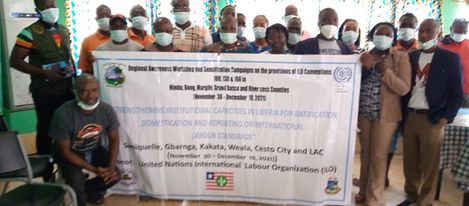PHOTO: Participants at the Labour Statistics sensitization
By Augustine Octavius, augustineoctavius@gmail.com
An ILO official in Liberia has stressed the importance of Labor Statistics in helping government and development partners to develop programs for enhancing decent living and working conditions of people in the Labor sector.
Haji Salif Massalay, the Country Manager of the International Labor Organization said that the ILO Convention Number 160, which is referred as the “Labor Statistics Conventions”.
It first came into being in 1938 and was known at the time as “Statistics of Wages and Hours of Work Convention otherwise known as C-63” but was changed in 1985 to Labor Statistics Convention, he noted.
Mr. Massalay was speaking during the regional awareness and sensitization on three International Labor Organization Conventions recently ratified by the Liberian government.
He said each member state of the ILO, which ratifies this convention is expected to regularly collect, compile and publish basic labor statistics, which shall be progressively expanded in accordance with its resources to cover the following subjects:
According to him, economically active population, employment, where relevant unemployment, and where possible visible underemployment; structure and distribution of the economically active population, for detailed analysis and to serve as benchmark data.
Others are average earnings and hours of work, where appropriate, time rates of wages and normal hours of work; and wage structure and distribution.
The ILO Country Manager said that the convention number160 also looks at labor cost; consumer price indices; household expenditure, family expenditure, household income, family income; occupational injuries and, as far as possible, occupational diseases; and industrial disputes.
The ILO official said that labor statistics is about the collection of empirical figures which is gathered through research on household expenditure on a monthly and yearly basis.
He said that if there are statistics on these labor indicators, it will help guide the government in setting up a minimum wage for workers as well as in directing programs that are aimed at improving the living conditions of workers and their families in the country.
The ILO conventions are: C-100 which speaks about “Equal Pay for Work of Equal Value”, C-138 talks about “Minimum Age for Admission to Work” and C-160 which is referred to as “Labor Statistics Convention”.
Speaking further, Mr. Massalay said that conventions 100 and 160 are key fundamental and human rights conventions that speak to wage determination for workers and the improvement of their livelihood.
In order to ensure its effectiveness, he said governments are expected to conduct a labor force survey after every four years as means of making determination on these labor indicators.
According to him, the labor force survey is a major requirement of these conventions.
Mr. Massalay lamented that current statistics shows that unemployment in Liberia is low giving that the definition of the ILO states that “Anyone who had work for the last three weeks are considered employed”.
He however noted that 85.5% of Liberians are vulnerably employed meaning that there are more people doing work without job security or may breakdown after a short period of time.
This shows that more people in Liberia are employed but are vulnerably employed.
That is to say those huge numbers of Liberians are unemployed.
Also speaking, the head of the Regional Outreach team, Labor Ministry Communications Director, Joseph Kortu Nyandibo said that the outreach is the second phase of the regional awareness and sensitizations campaign on the three ILO Conventions recently ratified by Liberian government.
He said that the campaign which is being sponsored by the ILO is facilitated by members of the National Tripartite Council (NTC) of Liberia which is comprised of the Ministry of Labor representing government; the Liberia Labor Congress (LLC) representing workers/trade unions and the Liberia Chamber of Commerce (LCC), representing employers in Liberia.
Mr. Nyandibo said that the outreach is intended to increase the knowledge and understanding of social partners in the labor sector as well as community leaders on the conventions.
He named activities being carryout by his team as: Talk shows, Town Hall meetings and community engagements.
It covers six counties of Liberia namely Nimba, Bong, Margibi, Bassa, Grand Cape Mount and Bomi.
In conclusion, the ILO Country Coordinator said that the Equal Remuneration Convention is based on the principles of equality, non-discrimination and proportionality.
So is the minimum age convention,which is based on human rights principles and rooted in the Convention on the Rights of a Child.
He thanked the Government of Liberia and in particular the Minister of Labor for ratifying these conventions in addition to the 1986 Amendment to the ILO Constitution.

